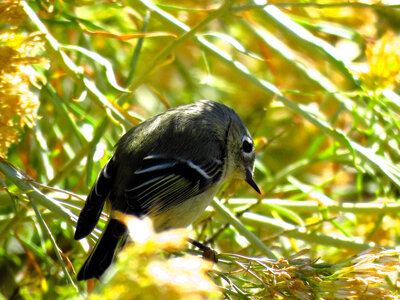
Photo courtesy Charles Martinez
This week’s Bird of the Week, compliments of the Weminuche Audubon Society and Audubon Rockies, is the ruby-crowned kinglet.
At only 4 inches long and weighing only as much as a nickel, this tiny songbird is smaller than some hummingbirds. Yet this bubbly bird lives life on a scale out of proportion to its small size.
Take its song, described as loud and jumbled, that is one of the constants of our summer forests. The three-part melody, which starts with a series of very high-pitched notes and drops to a mix of repeated two- and three-syllable phrases, would have you looking for a larger bird. During breeding season, the male barely stops for a breath before belting out another round.
Both sexes are olive-green colored and have a prominent white eye-ring that gives them a startled look. A white wing-bar has a black bar below. Only the male displays the ruby-crown of red feathers and then only when he is excited, in courtship or defense.
These kinglets prefer old, dense stands of tall spruce and fir for breeding. During our spring bird surveys on Jackson Mountain, the woods were alive with them in the spruce/fir forests and they were largely absent in the Ponderosa pine.
For her size, the female lays a very large clutch of eggs, numbering as many as 12. The weight of the egg clutch itself may equal that of the female. Large brood sizes compensate for the high winter mortality rates that these birds experience in cold years.
Ruby-crowned kinglets forage in a frantic manner for insects, spiders and their eggs, taking them from the foliage, limbs and trunks of trees and shrubs and in mid-air. Even in the rare instances when they take a break, they constantly flick their wings. Although they are not considered feeder birds, they are attracted to suet feeders and some fruits and berries.
Most ruby-crowned kinglets migrate south in fall, but some move to lower elevation shrubby areas and stay in our area during winter.
For information on events, visit, www.weminucheaudubon.org and www.facebook.com/weminuchaudubon/.